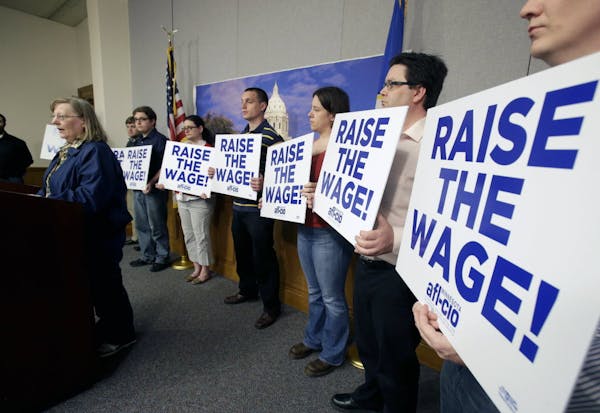The Minnesota Senate approved $1.8 billion in tax increases on a second try Monday, but only after salvaging the measure amid an embarrassing political defeat for Democratic leaders.
Minutes after the measure's stunning failure by two votes, stern-faced DFLers marched back to their seats after a private meeting with Senate leadership and promptly fell into line to pass it.
"Tax bills are always hard," DFL Senate Majority Leader Tom Bakk said after the final 35-to-31 vote. "It's easy to vote for the spending bills, but who's going to vote for the tax bills that pay for it?"
The surprising flash of drama highlighted how shaky the coalition is around the largest tax increase in recent history. It also is a flustering moment for Senate Democrats, who have been trying to portray a unified front as they push for new spending on education, economic development and property tax relief.
The measure's initial defeat and its eventual passage unleashed a torrent of criticism from Republicans, who said the reversal highlights Democrats' determination to impose major tax increases that even some members know will harm the state. "It's a complete embarrassment that they had that much trouble getting it passed," said Sen. Julie Rosen, R-Fairmont.
Senate Democrats now must fight for a measure with flimsy support against skeptical House leaders and DFL Gov. Mark Dayton, who doesn't support several key components of the plan.
The DFL-led proposal would lower the sales tax rate to 6 percent from 6.875, its lowest level in 22 years. But the state would make back all of the $1.1 billion from the rate reduction by broadening the sales tax to include an array of goods and services, such as a first-ever tax on clothing, auto repair, dating services and haircuts.
To ease the pain of the clothing tax, Senate DFLers are offering a tax credit; a family of four earning $46,000 a year would get a $105 credit.
The Senate bill would wrestle down the state's $627 million budget deficit and, DFLers say, break the cycle of back-to-back budget deficits. The new tax money would help pay for new education spending and provide assistance for substantial expansions for 3M in Maplewood, the Mall of America in Bloomington and Mayo Clinic in Rochester. The measure also would lower the corporate income tax rate to its lowest level in 50 years.
The bill also would break from Dayton's budget blueprint in crucial ways, raising income taxes for married filers who make more than $140,000. Instead, Dayton is strongly backing a new top-income tax tier for those who make more than $250,000 a year — the top 2 percent of Minnesota taxpayers.
"We have a clear difference of view on that," Dayton said in a recent interview with the Star Tribune. "I stand on my proposal, and don't want to raise taxes on the middle-class."
Many wrinkles to iron out
Meanwhile, Republicans say Democrats are violating their pledge to boost taxes only on high earners and are instead raising taxes for all Minnesotans to appease their hunger for new spending. "It's not courageous to raise taxes and spend other people's money," said Senate Minority Leader David Hann, R-Eden Prairie. "This is not a tax on the rich; everybody will pay more."
The Senate plan does not include a key component of the House tax proposal, a $1.2 billion temporary income tax surcharge on those making more than $500,000. The House also wants to raise the alcohol tax, something Senate leaders say would strike at the heart of the middle class.
The Senate, House and Dayton will spend the next few weeks working out their differences on taxation.
Senate DFLers are trying to make good on a campaign pledge by using a sizable chunk of the new money to reduce property taxes.
The Senate wants to send $450 million in new money to local governments and school districts to drive down property taxes. For the owner of a $221,500 home in the Twin Cities, the Senate plan would trim $113 from their property tax bill, about 3.6 percent.
The House is pressing a different solution — direct property tax rebates. But the Senate, which is not up for election next year, argues that a large chunk of rebate checks goes to the federal government in the form of higher income taxes.
Sen. Dave Senjem, R-Rochester, was the lone Republican to vote in favor of the tax proposal. He grudgingly accepted the "hurtful" tax hikes to put his stamp of approval on the expansion of Mayo Clinic, an enormous economic engine and the state's largest private employer.
The Mayo funding, he said, "is a rose in a bed of rocks."
baird.helgeson@startribune.com • 651-925-5044 jennifer.brooks@startribune.com • 651-925-5049
Finding an apartment may be easier for California pet owners under new legislation
AP Decision Notes: What to expect in Pennsylvania's presidential and state primaries

